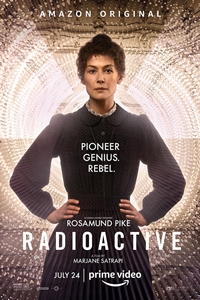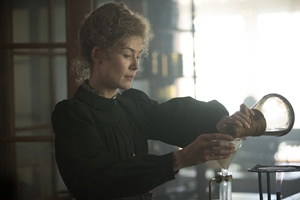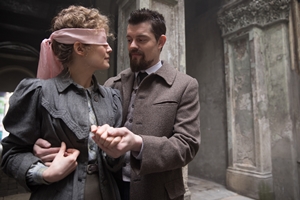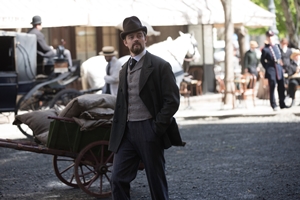Canada: Friday, September 18, 2020
Calgary: Friday, September 25, 2020
Amazon Studios
for thematic elements, disturbing images, brief nudity and a scene of sensuality
http://www.radioactivethemovie.com
From the 1870s to the modern era, RADIOACTIVE is a journey through Marie Curie's (Rosamund Pike) enduring legacies - her passionate relationships, scientific breakthroughs, and the consequences that followed for her and for the world. After meeting fellow scientist Pierre Curie (Sam Riley), the pair go on to marry and change the face of science forever by their discovery of radioactivity. The genius of the Curies' world-changing discoveries and the ensuing Nobel Prize propels the devoted couple into the international limelight.
Cast & Crew
Movie Cast
Movie Crew
User Reviews
Public Reviews - 1 Reviews
-
Gregory M. - Rated it 3 out of 5
"Radioactive" From the 1870s through to modern day, "Radioactive" is a journey through Marie Curie’s (Rosamund Pike) enduring legacies, her passionate partnerships, scientific breakthroughs, and the consequences that follow. In late '19th Century' Paris, Marie met fellow scientist Pierre Curie (Sam Riley). The pair went on to marry, raised two daughters and changed the face of science forever by their discovery of radioactivity. In 1903, the pair jointly won 'The Nobel Prize' in physics for their discovery, making Marie the first woman to win the esteemed prize. After the death of her beloved Pierre, Marie’s commitment to science remained unwavering and her work went on to win her a second 'Nobel Prize', taking with it the responsibility for discoveries which changed the world. This is a bold, visionary depiction of a legacy of an extraordinary life, the transformative effects and ensuing fallout of the Curie’s work and an exploration of how this impacted the defining moments of 'The 20th Century'. "Radioactive" is a cutting-edge historical drama which delves deeply into Marie Curie’s life and the aftermath of her discoveries. The film has three historical eras; 1893-1906 which forms the main part of the story; 1906-1911/12 after Pierre's fatal accident; and finally 1914 to Marie's death in 1934. The film starts in 1934 with the aged Marie Curie and then goes in two directions, back through her life and from the beginning of her life forward, in an overlapping narrative. Usually a film takes place in one place or period and there’s one language, but here we’re dealing with so many different languages, even 'The French' content spans a 50-year timespan. She arrives in Paris from Poland as Maria Skłodowska and reinvents herself as Marie Curie. 1886 is an era of huge discovery, whereas now we live in a world of innovation where we just enhance the discoveries that we already have. It's an extremely exciting time and you can see it in the way the women are received. When she arrives in Paris and enrolls at 'The Sorbonne', she's one of only 23 women in a science faculty of 4,000. At the time, in France, the word étudiante, the feminine version of 'The French' for student, is only used to describe the girlfriend of a male student; there isn't even a word for a female student. But Marie excelles and comes top of her class. But she's noted for being quite odd and outspoken and having no real gentleness in her approach to things, because she didn’t really see any point. She wants to get things done, and she's only really interested in science. Her discovery which she names radioactivity is the single most extraordinary discovery of 'The 20th Century'. The '1900s' are actually a moment of freedom and liberation for women. In 1903 Marie and Pierre Curie win 'The Nobel Prize' in physics for their discovery of radioactivity, marking the first time the prestigious award has been bestowed on a woman. After Pierre's sudden death, Marie continues her work and wins a second 'Nobel Prize' in 'Chemistry' in 1911. Marie Curie is an icon of the scientific world, a pioneer not just as a scientist but also as a woman working within a man's world whilst women were still campaigning for the right to vote. Together, 'The Curies' discover two new scientific elements, radium and polonium, with remarkable properties which would have consequences, both good and bad, that are still impacting us today; nuclear weapons, radiation for medical treatment and nuclear energy. Their working and romantic relationship turn them into celebrities, but after Pierre's death in 1906, Marie's reputation takes a blow after she has an affair with a married man. Marie grows up in Russian-occupied Poland, where she and her sister were forced to study the Russian curriculum. She led an uncompromising life. She never let her femininity get in the way of her achievements. She's also relentlessly honest, relentlessly true to herself. And she's poetic and represents the ultimate marriage of arts and science, and perhaps even more, the ultimate marriage of love and science. She has a scientific mind being a mathematician. And she really understands the connection between the science, our make up as human beings and our emotional lives. Marie Curie never defines herself as a successful woman. She defines herself as a successful scientist. Gender is irrelevant to her, and is very much of that mindset as well. She has no filter, she’s outspoken, she’s bold, she’s not essentially charming, and yet she’s charming because of all her oddities. On the page Marie Curie is very uncompromising, rude, confrontational, brash, arrogant. The character of 'Marie Curie' is an antidote to the stereotypes usually found on the big screen. Pierre Curie was raised in a non-religious family which was quite unusual for the time and when he meets and fell in love with Marie Curie, he's working with his brother Jacques (Ed Fleroff) on the invention of the quadrant electrometer, which measured the electrical values of different materials. Pierre comes from an extremely open-minded background, not the average 'Catholic French' family, and he wants a wife who he can work with and who challenge him. Marie is not his muse but rather they're two brilliant spirits, for the time they're an absolutely modern couple. It's so rare for two people to have a complete meeting of minds, to work to the common goal. And when he died so tragically, it crushes her. "Radioactive" doesn’t really conform to any existing genre of cinema, because it goes narratively in different directions, in different countries and in different time periods. The film creates a hospital complex where you can seamlessly go from 1874 Poland through a door into 1960s America, and then through another door into the hospital ward in 'Pripyat' near 'Chernobyl', after the explosion in 1986, and then through another door, through a part of 'Chernobyl' now, and down this enormous corridor, 120 metres of corridor, which is where her death plays out and the end of the film happens. The corridors of the hospital are mirrored in the several tunnels that feature in the film, including in metal tunnels in 'The Chernobyl' plant and the tunnel as Marie Curie buries her mother as a child in Poland in 'The 1870s'. So there are things fizzling in test tubes in very small detailed shots, and as we go through the film, the colours get more saturated and a glow of radium suffuses the film. Marie's costumes in the first section comprise simple white shirts with 'Peter Pan' collars and pin tucks and wide, full-length skirts. By 'The First World War', corsets are beginning to become less common and there's a much looser, more shapeless silhouette by 1920s and the 1930s. The color palette for all Marie's costumes range from greys, black and white to blues and greens, a visual link to Marie's great love for science in the costumes. The film is based on Lauren Redniss's graphic novel ‘Radioactive: A Tale Of Love And Fallout' in 2012. Beautiful, poetic, deeply serious about the science, unafraid of getting into an emotional journey around science, and about a really inspirational woman. It's a grippy story of the life and the work of Marie and Pierre Curie. But it’s also the story of the consequences of their work. So at once, it’s an historical biopic of a great woman and her husband and a story of the impact of their discoveries on 'The 20th Century' and beyond. The film aims to give audiences a sense of how important Marie Curie is and the vital role she played in changing the course of human history. Everybody knows her name but hardly anyone can tell you much about her. Marie and Pierre Curie are very important. They changed the history of the world with their discovery of the twin elements of radium and polonium and that there's a fundamental instability at the heart of the universe. As we say in the story, they picked up the pebble and they cast it in the pond, but they’re not responsible for the ripples. The consequences of their discoveries and the immense power that can been harnessed through them have been put to terrible use and to very good use; radioactivity at once causes cancer and cures cancer. At the heart of this story is an extraordinary mind that's able to get to grips with how the universe was formed, and how mankind could interact with two of it's most powerful elements. "Radioactive" creates a pretty complex time frame, where we go forward in time to beyond Marie’s death, or we go back to when she’s a child. We move around quite freely within the story; it travels from the 1870s to the 1980s and includes almost every decade in between, from 'Chernobyl', to 'Hiroshima', to the introduction of radiography machines, the first mobile X-ray units. We see the good and the bad consequences of Marie and Pierre’s discoveries, the discovery of an element and then the consequences of that discovery in a scene which is utterly unrelated. It’s like a biopic at once, of a woman, but also of her scientific discoveries. Most of the time we blame the scientist for the discovery of something. Science is for me synonymous with being human and curious, and the film addresses the lasting effects of a discovery which is highly important to talk about. We live in a world where we’ve known about this all our lives. But imagine you’d never seen inside the human body, and suddenly there's the skeleton! You can see why at the same time as the science is taking off, the world of supernaturalism and spiritualism is also taking off. Suddenly the spirit world seems to be very close to us. written by Gregory Mann




